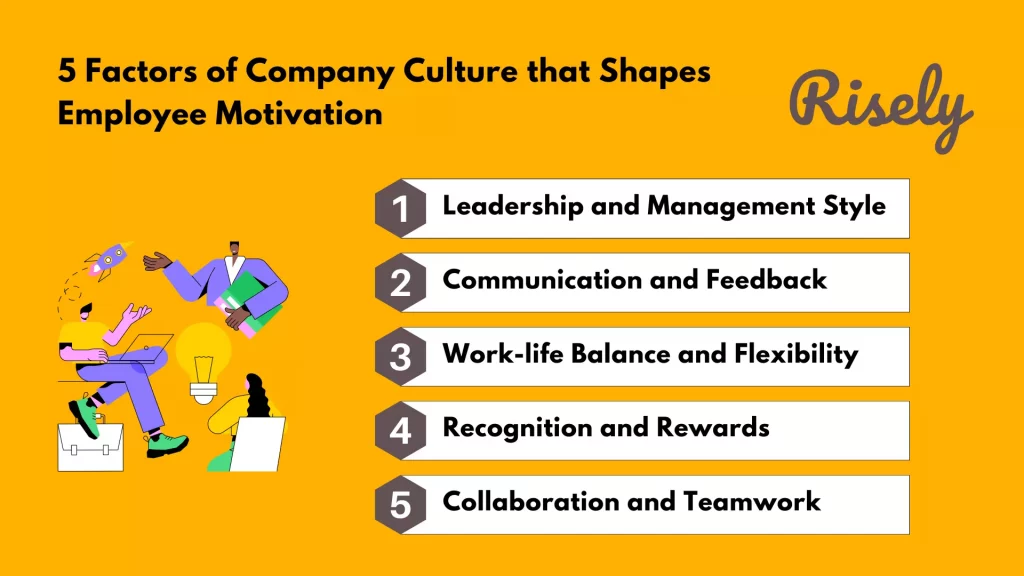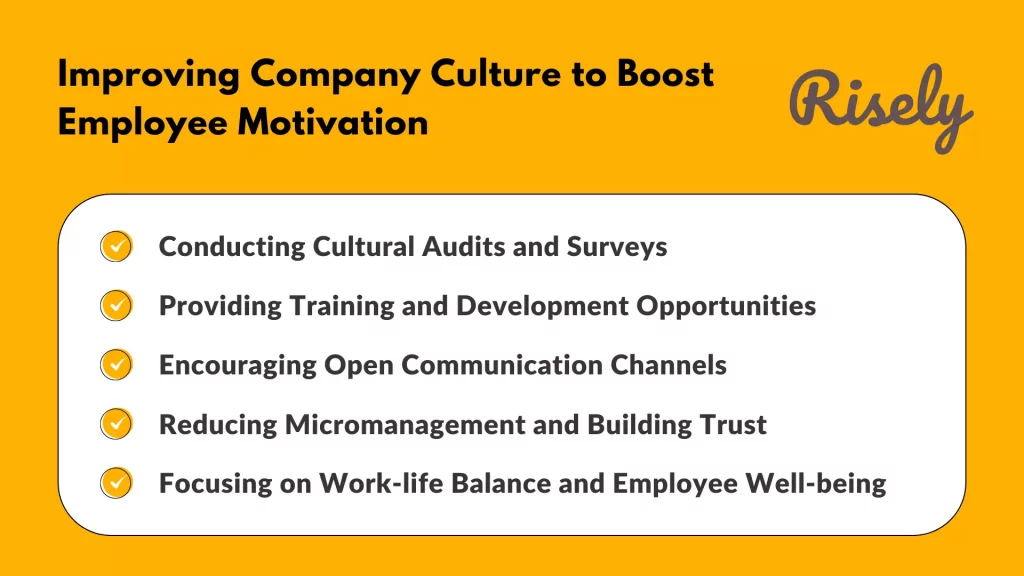How Company Culture Shapes Employee Motivation? A Manager’s Guide
Are you looking for ways to motivate your employees and improve their productivity? Look no further than your company culture. The environment and values that you cultivate within your organization have a direct impact on employee motivation. Therefore, understanding how company culture shapes employee motivation is crucial for creating a positive work environment where everyone feels valued and driven to succeed. In this blog, we will define company culture, why it is important in employee motivation, and the factors that impact it. We’ll also discuss the difference between good and bad company cultures through different scenarios, along with tips on how to improve your company culture so that it promotes better team motivation.Understanding Company Culture and Its Importance in Employee Motivation
Company culture refers to an organization’s shared values, beliefs, and behaviors. It is a critical factor in shaping employee motivation and engagement. A positive team culture fosters an environment where team members feel supported, valued, and motivated. Leaders play a crucial role in shaping and maintaining team culture by setting the tone for how team members should behave and interact with each other. Key elements of a strong culture include transparency, trust, collaboration, accountability, and recognition of achievements. Leaders play a vital role in creating and maintaining a healthy team culture by modeling desired behaviors and communicating clear expectations. Defining and nurturing an optimistic company culture benefits managers and team members long-term. Teams can cultivate a positive culture through communication that promotes transparency, recognition that acknowledges hard work, and employee development programs that help workers grow professionally. In addition, a strong organizational culture can lead to higher retention rates as team members feel more connected to their workplace. Moreover, it helps attract top talent looking for a team whose values align with theirs. Overall, understanding the importance of team culture is critical to creating a workplace where team motivation thrives.Why is Company Culture Important in Employee Motivation?
Company culture plays a crucial role in employee motivation because it sets the tone for how team members are treated, how they interact with one another, and what values the team holds dear. A positive company culture can create a sense of belonging and purpose among team members, making them more engaged and committed to their work. Team members who feel valued and supported are more likely to be productive and motivated to achieve their goals. A solid team culture can attract and retain top talent while fostering innovation and collaboration. Companies that prioritize their culture are more likely to have happy and motivated team members who are invested in the organization’s success. On the other hand, harmful or toxic company culture can have the opposite effect, leading to low morale, high turnover rates, and poor performance. An organization’s leadership is critical in shaping its culture and motivating team members. Leaders who prioritize employee well-being, open communication, and a sense of community can create a positive work environment that fosters motivation.Other Interesting Reads
How Company Culture Shapes Employee Motivation? Major Factors
Motivation in organizations is impacted by many factors, including the team’s culture. Some of the important aspects of team culture that affect motivation in organizations are:
Leadership and Management Style
One of the key factors in a team’s motivation level is the leadership and management style within the team. A positive and supportive leadership style can encourage team members to be more engaged and committed. In contrast, an aggressive or micromanaging leadership style can decrease motivation and job satisfaction. In addition to leadership, team values, and mission also shape organizational culture and influence employee motivation. Creating a culture of trust, transparency, and open communication can further enhance team motivation. By prioritizing these factors within a team’s culture, managers can create an environment that fosters employee creativity, productivity, and job satisfaction.Communication and Feedback
Effective communication and feedback are integral to a positive culture that can significantly impact employee motivation. A culture that encourages open communication allows team members to share their thoughts and ideas, increasing engagement and motivation. Regular feedback is also essential as it helps team members understand how they are performing and provides opportunities for growth and improvement. A culture that values transparency and honesty through communication builds trust among team members, which can further enhance motivation levels in the workforce. On the contrary, a lack of communication and feedback can create a negative environment that can lead to demotivation among team members. Therefore, employers must prioritize building an open and transparent work environment that fosters effective communication and offers regular feedback to its team members to keep them motivated.Work-life Balance and Flexibility
Another factor of team culture that can significantly impact team motivation is work-life balance and flexibility. An organizational factor culture that prioritizes these values may offer flexible work schedules, remote work options, and generous time off policies. In addition, team members who feel that their personal lives are respected and supported tend to be more engaged and productive at work. Furthermore, a positive culture promotes open communication, recognition, and a sense of belonging among team members. Investing in a supportive and flexible work environment can lead to happier team members who are more motivated to contribute to the success of the team.Recognition and Rewards
Recognition and rewards are vital in shaping team culture and motivating team members. When team members feel recognized for their contributions and rewarded for their hard work, they are more likely to feel valued and inspired to do their best. Rewards can come in many forms, such as bonuses, promotions, or even public recognition of a job well done. In addition to individual recognition, teams can also build a culture of teamwork and collaboration that encourages team members to support each other and work towards common goals. Managers can create a more motivated and engaged workforce by fostering a positive organizational culture that values and recognizes its team members. It not only leads to higher productivity but also helps to retain top talent and attract new hires who are attracted to a positive workplace environment.Collaboration and Teamwork
Collaboration and teamwork are two important factors that greatly impact employee motivation within a team culture. When team members feel supported by their peers and are encouraged to work together, they are much more likely to feel motivated and engaged. In addition, open communication and transparency are key elements of a positive culture that fosters trust and mutual respect among team members. Providing opportunities for professional development and growth is another way to help team members feel valued and invested in the team’s success. It can include offering training programs or mentorship opportunities. In addition, by acknowledging hard work and accomplishments, employees are more likely to feel recognized and appreciated for their contributions to the team’s success.
Good vs. Bad Company Culture on Employee Motivation: Scenarios
Organizational culture shapes employee motivation, engagement, and overall job satisfaction. A good team culture fosters a sense of belongingness, purpose, and fulfillment among team members, boosting their motivation levels. A toxic workplace environment, on the other hand, can lead to job dissatisfaction and low employee morale, ultimately resulting in decreased motivation. Let’s look at this through some scenarios!Scenario 1: Motivated Team in a Positive Environment
Let’s say there’s a team of software developers who work for a good manager. They’re tasked with developing a new app for the team, and the project is relatively complex, with a tight deadline. The team has a positive culture, where team members respect and trust each other, and everyone is willing to lend a hand when someone needs help. As they work on the project, they encounter a problem they can’t solve independently. One team member, who’s particularly good at problem-solving, suggests a possible solution. However, they’re not entirely sure if it’s the best approach, so they turn to the rest of the team for input. They have a lively and respectful discussion and develop a solution that incorporates everyone’s ideas and is more effective than the original proposal. The positive team culture had a significant impact on the team members in this scenario. First, the team members felt comfortable speaking up and offering their opinions, which led to a more creative and effective solution. Second, everyone felt valued and respected, which increased their sense of belonging and commitment to the team. Finally, the positive culture encouraged collaboration and trust, making the team more resilient and adaptable in facing challenges. Check out “Boosting employee morale: The power of employee encouragement in the workplace“Scenario 2: Demotivated Team in a Negative Environment
Team members can become demotivated in a negative work environment, lacking enthusiasm and commitment. In addition, micromanagement, lack of trust, favoritism, and poor communication can contribute to a negative team culture. It can increase stress levels, burnout, and high employee turnover rates. Let’s see how it impacts a similar team facing the same issue. A team of software developers works for a manager with a negative management style. The team is tasked with developing a new app, which is complex and has a tight deadline. As they work on the project, they encounter a problem they can’t solve independently. One team member, who’s particularly good at problem-solving, suggests a possible solution. However, the other team members don’t listen to the proposed solution and dismiss it immediately. The team members don’t have discussion, and no one feels comfortable speaking their mind or contributing their expertise. Instead, they argue and blame each other for the problem. Ultimately, they don’t develop a solution that incorporates everyone’s ideas, and the project suffers. The negative team culture hinders their ability to work collaboratively and effectively, and the project falls behind schedule. The negative team culture had a significant impact on the team members in this scenario. First, the team members didn’t feel comfortable speaking up or offering their opinions, leading to a lack of creativity and limited the team’s problem-solving ability. Second, team members didn’t feel valued or respected, which decreased their sense of belonging and commitment to the team. Finally, the negative culture fostered distrust and conflict, making the team less resilient and adaptable to challenges. Check out “Are your motivation problems holding you back? Here’s how to fix them“How to Improve Company Culture for Better Employee Motivation?
Organizational culture plays a significant role in shaping employee motivation. A positive, supportive culture can increase job satisfaction and productivity and help retain top talent. To improve team culture for better employee motivation, it is essential to focus on cultural motivators, some of which are listed below:
Conducting Cultural Audits and Surveys
One way to improve culture is by conducting cultural audits and surveys. It can help identify problem areas and determine what changes need to be made to create a more positive and supportive work environment. Ensuring that these audits and surveys are anonymous is important so team members feel comfortable being honest in their feedback. Creating a positive and supportive work environment is critical to fostering team motivation. Open communication and feedback can also help build a sense of belonging and trust.Providing Training and Development Opportunities
A successful strategy for improving the culture involves offering opportunities for training and development. When team members feel that their employer invests in their professional growth, they are more likely to feel valued and motivated. Training and development programs have also been shown to improve job satisfaction and retention rates. Check out “Coaching for Motivation in the Workplace 5 Effective Tips“Encouraging Open Communication Channels
Encouraging open communication channels is one effective way to foster a positive team culture. By encouraging team members to share their ideas, concerns, and feedback, they feel valued and heard, which can create a sense of belonging and ownership in the workplace. Effective communication can also help ensure everyone is on the same page and working towards common goals. Creating a safe and supportive environment where team members feel comfortable expressing themselves is crucial in promoting open communication. Regular team meetings, one-on-one check-ins, and anonymous suggestion boxes are a few ways to encourage this open dialogue. By implementing these practices and actively listening to feedback from team members, companies can improve their culture and boost employee motivation.Reducing Micromanagement and Building Trust
Improving team culture is crucial in boosting team motivation and productivity. One important step is to reduce micromanagement, which can lead to decreased motivation and job satisfaction among team members. In addition, building trust with team members is essential in creating a positive work environment that fosters inspiration and productivity.Focusing on Work-life Balance and Employee Well-being
Focusing on work-life balance and employee well-being is an excellent cultural motivator that managers can use. By offering flexible work arrangements and implementing programs that support employee health and well-being, companies can help team members feel valued and reduce burnout. Employee well-being programs like mental health support or gym memberships can also improve morale and motivation. Creating a supportive and inclusive workplace culture is another effective strategy for boosting team motivation. When team members feel like they belong and have a sense of purpose within the team, they are more likely to be motivated and engaged in their work.Conclusion
In conclusion, organizational culture plays a vital role in employee motivation. It is the backbone of any organization and can make or break employee morale, job satisfaction, and productivity. Good company culture ensures team members are happy, fulfilled, and motivated to give their best to the organization. On the other hand, bad culture can be detrimental to team motivation, leading to high turnover rates and low morale. To improve your company’s culture for better employee motivation, conduct cultural audits and surveys, provide training opportunities, and encourage open communication channels. Ultimately it is important to prioritize employee well-being by focusing on work-life balance and reducing micromanagement.Cultivate the right mindset to foster a positive team culture.
Unlock the secrets to a great company culture with Risely’s free growth mindset toolkit for managers.
FAQs
How does a company’s culture shapes an employees motivation to do the work?
Company culture is one of the important determinants of an employee’s motivation to work. While a positive company culture can motivate employees through its openness and adaptability, a negative company culture can demotivate and disengage the employees. Team members in a positive culture are more likely to be innovative and focused on their jobs as they find a sense of purpose at work.
How does company culture impact employees?
Company culture impacts employees in many ways. Most commonly, the impact includes:
– Level of motivation at work
– Ability to contribute in teams
– Cultivating ownership and accountability
– Behaviors of team members
– Level of motivation at work
– Ability to contribute in teams
– Cultivating ownership and accountability
– Behaviors of team members
How can you tell if your company culture motivates employees?
A few ‘signs of a great company culture that motivates employees include:
– High rate of participation and low absenteeism
– Employees are open to new ideas and flexible in their approach
– Good brand equity as an employer
– Employees are comfortable in raising questions and concerns
– High rate of participation and low absenteeism
– Employees are open to new ideas and flexible in their approach
– Good brand equity as an employer
– Employees are comfortable in raising questions and concerns
What is corporate culture and how does it shape an employee?
Corporate or company culture is the set of beliefs and values that lies at the core of a team’s actions and philosophy. It impacts the environment and employees closely by being a source of motivation and norms for the team. It shapes the work culture, employee behaviors, management style, and attitudes in the workplace.
Other Related Blogs
Building a Coaching Culture with Jo Wright
Building a Coaching Culture with Jo Wright As AI takes over, we are all searching for the part that makes us truly human. For most managers and leaders, this search…
What’s Culture Add and Culture Fit? | Victor Bullara
What’s Culture Add and Culture Fit? | Victor Bullara Do we hire for culture, or not? This has been a long raging debate. We create our take on this dialogue…
8 Ways To Undo A Toxic Workplace Culture
8 Ways To Undo A Toxic Workplace Culture As per Gallup’s research in Australia, mental health conditions contributed to 9% of all work-related injuries. In another global study, almost one…
How To Build A Learning Culture At Work?
How To Build A Learning Culture At Work? Go back to the beginning of your career. Fresh out of college and looking at the prospect of your new fancy job…


